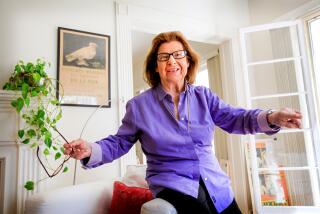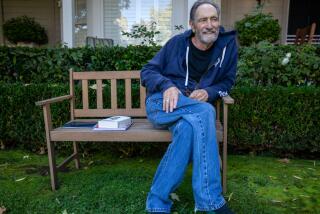Christopher Trumbo dies at 70; screen and TV writer whose father was blacklisted
- Share via
Christopher Trumbo, the screen and television writer son of Oscar-winning screenwriter Dalton Trumbo, who was blacklisted and imprisoned during the Red Scare as a member of the Hollywood 10, has died. He was 70.
Trumbo died Saturday from complications of kidney cancer while in hospice care at his home in Ojai, said his sister, Mitzi Trumbo.
During a more than 40-year writing career launched in 1967, Trumbo wrote episodes of TV series such as “Ironside,” “Quincy, M.E.,” and “Falcon Crest” — as well as co-writing the 1973 crime drama “The Don Is Dead,” starring Anthony Quinn; and the 1975 crime drama “Brannigan,” starring John Wayne.
He also was known as an authority on the blacklist era, a specialty that grew from his firsthand knowledge.
That most notably included writing a two-character play based on his father’s letters, “Trumbo: Red, White & Blacklisted,” which tells the story of Dalton Trumbo’s life and the blacklist through the words in his correspondence.
An off-Broadway production of the play, directed by Peter Askin, opened at the Westside Theatre in 2003 with Nathan Lane as Trumbo and Gordon MacDonald as the narrator.
The play ran a little over a year and boasted a string of familiar names who took over the Trumbo role, including Brian Dennehy, Gore Vidal, Richard Dreyfuss, F. Murray Abraham and Chris Cooper. A national tour of the play starring Dennehy followed.
Dalton Trumbo’s letters also were the basis of the Christopher Trumbo-written and Askin-directed “Trumbo,” a 2007 film that was part documentary and part performance by actors such as Lane, Dennehy, Paul Giamatti, Liam Neeson and Donald Sutherland.
“Actors love the language in those letters; that’s why we were able to attract them,” Askin told The Times on Tuesday. “This was great material for actors to work with.”
Askin said Christopher Trumbo “was a passionate, articulate spokesman for the time of the blacklist.”
“He learned about it from his father and experienced it, and he was absolutely articulate and vigilant in everything he did being an accurate interpretation of what that time was like and the principles his father stood for,” Askin said.
And Trumbo “was funny the way his father was,” he said.
“You could tell he had absorbed his father’s biting sense of humor and independence of spirit,” he said. “You really felt like you were in his father’s world when you were listening to Chris.”
Born Sept. 25, 1940, in Los Angeles, Trumbo was 7 when his father was subpoenaed by the House Un-American Activities Committee as part of its investigation into “communist infiltration of the motion picture industry.”
As one of the Hollywood 10 who refused to cooperate with the committee by challenging its right to ask questions about their political beliefs, Dalton Trumbo and the others were blacklisted by the studio owners.
After he and the others were indicted for contempt of Congress, tried, convicted and sentenced to prison, Dalton Trumbo spent 10 months in a federal prison in Kentucky.
Released in 1951, he and his family moved to Mexico City with the family of blacklisted screenwriter Hugo Butler. After nearly two years in Mexico, the Trumbos returned and settled in Highland Park.
The three Trumbo children felt the effects of the Red Scare and their father’s notoriety.
“My younger sister was thrown out of the Blue Birds [young Campfire Girls] for being undesirable,” Trumbo said in a 1996 Associated Press interview. “When I went to high school, the authorities tried to deprive me of one academic award because of my family background.
“Feelings about my father were strong enough to get a reaction from schools, private organizations and individuals who sent hate mail. That was the tenor of the times.”
After his release from prison, Dalton Trumbo resumed writing under a variety of pseudonyms.
“He used at least 13 different names and had an elaborate bank account system to protect himself and the producers from being detected,” Christopher Trumbo told The Times in 1989. “When I was 16 or 17, I was running around town with sometimes $10,000 or $20,000 in cash and checks, depositing them under these different names.”
In 1957, Dalton Trumbo’s story for “The Brave One,” which he wrote under the name Robert Rich, won an Oscar.
In January 1960, producer-director Otto Preminger openly defied the blacklist when he told the New York Times that Trumbo had written the script for “Exodus” and would receive screen credit. Seven months later, it was announced that Trumbo would receive sole screenplay credit on Kirk Douglas’ film “Spartacus.” Both films were released later that year.
Christopher Trumbo graduated from Columbia University in 1963, after taking off a year to work as an assistant director on “Exodus.”
He later worked as associate producer and assistant director on the 1971 anti-war drama “Johnny Got His Gun,” which was written and directed by his father.
“Christopher’s use of thought and language was unsurpassed,” said Michael Butler, the son of Hugo Butler and Christopher Trumbo’s writing partner in the late ‘60s and early ‘70s.
“Unlike most of us in the ‘60s, Christopher was dedicated to always doing the right thing,” Butler said. “He was an extraordinary moral and ethical human being. His path was always one of tremendous rectitude.”
Trumbo, who was frequently interviewed about the Hollywood blacklist and appeared in several documentaries on the subject, was working on a memoir/history of the blacklist at the time of his death.
Besides his sister Mitzi, Trumbo is survived by his wife, Nancy Escher; and his other sister, Nikola Trumbo.
More to Read
Start your day right
Sign up for Essential California for the L.A. Times biggest news, features and recommendations in your inbox six days a week.
You may occasionally receive promotional content from the Los Angeles Times.






